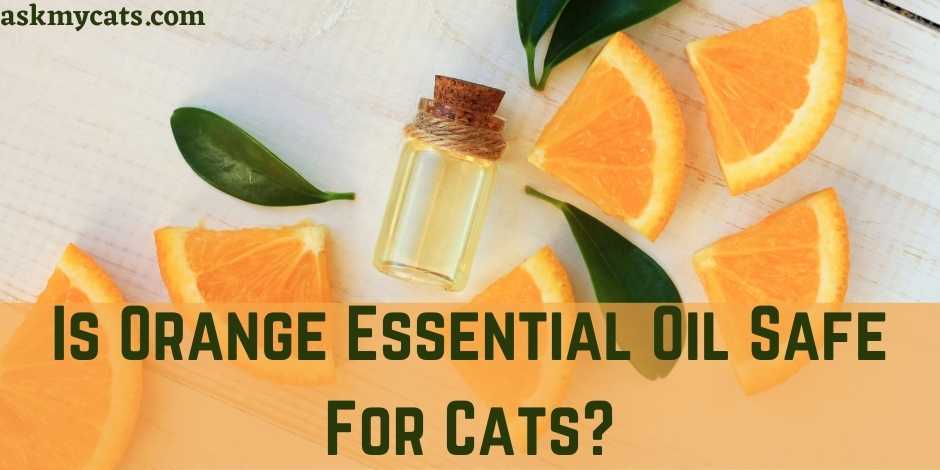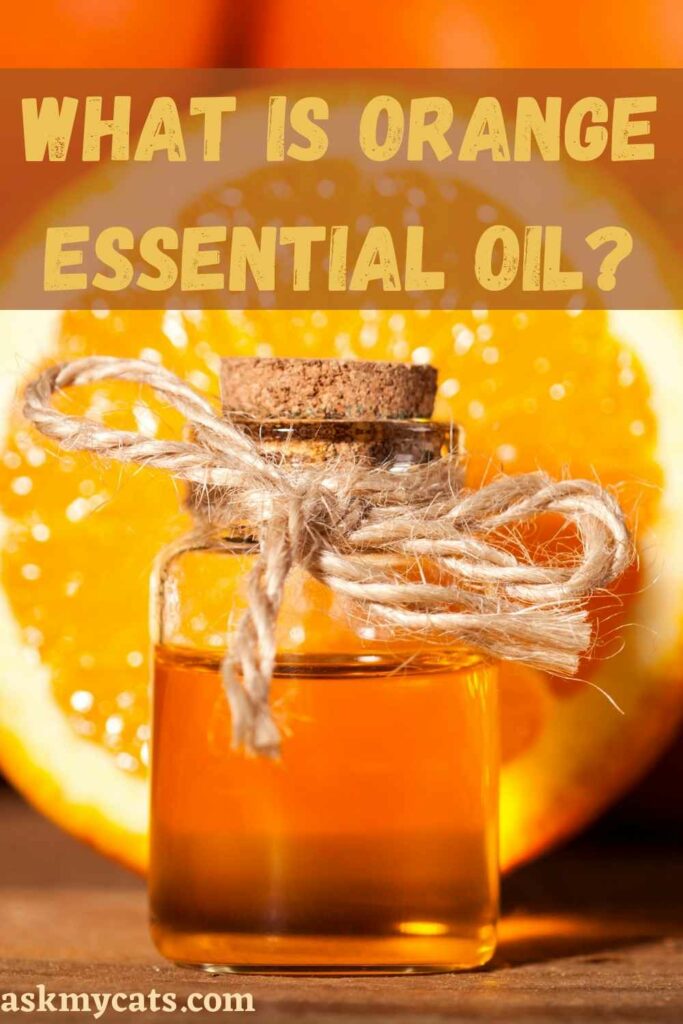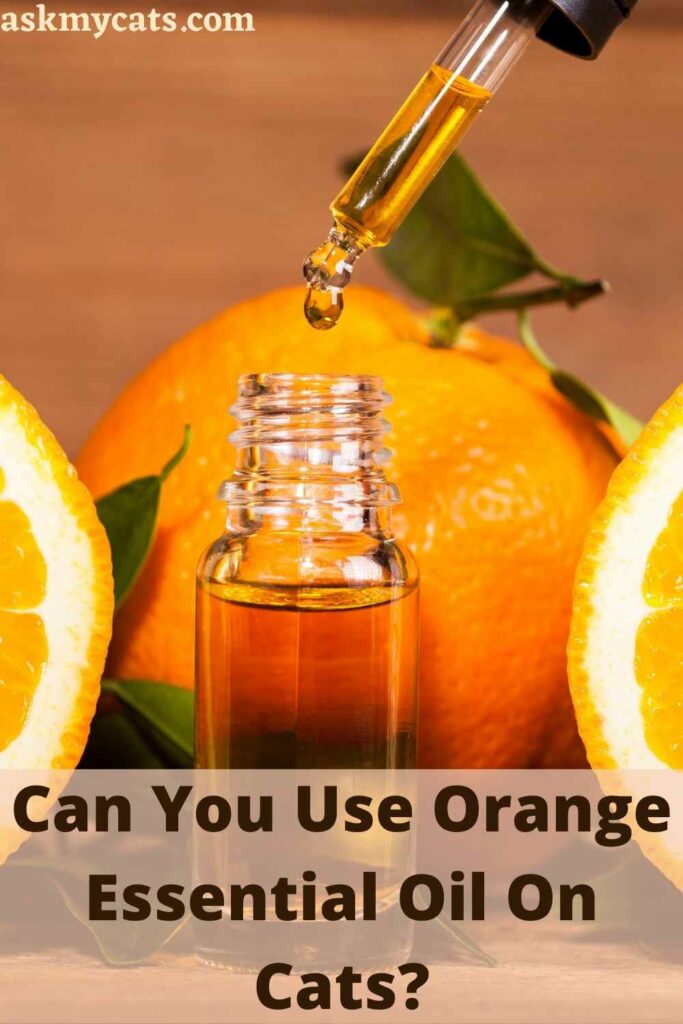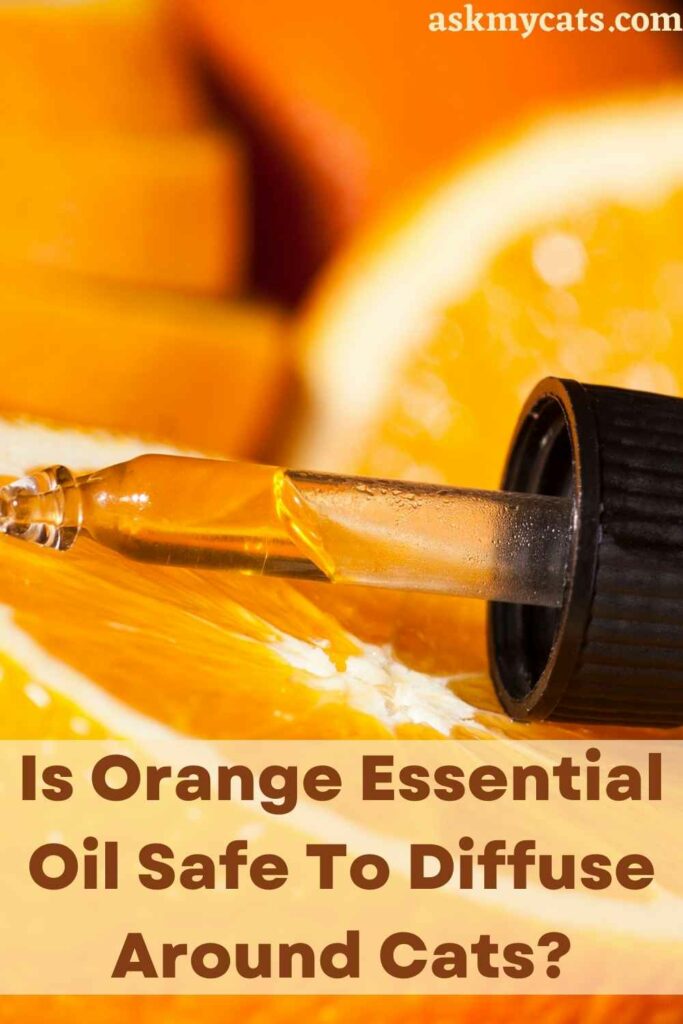For medicinal or aromatherapy purposes, many people use essential oils in diffusers on a regular basis. Others believe that rubbing essential oils directly on their cats will keep fleas and ticks away. However, no one knows why cats keep a safe distance and have a stranger gaze than usual. The scent of such essential oils is likely to turn the kitties off.
So, is orange essential oil safe for cats?
No, orange essential oil is not safe for cats because it is far too strong in its concentrated form to be used around cats. If they consume the oil, it could be fatal, and diffusing or using it in any other way around them could also make them sick.
This article will talk about, is orange essential oil is safe for cats and can you use it around cats.


Give Your Cat the Perfect Day
Get the Free Ebook!
What Is Orange Essential Oil?
Orange essential oil is extracted from the rind of the sweet orange, Citrus sinensis. This is done by a method called cold pressing.

Plants produce essential oils, which are concentrated oils. Citrus fruits, such as oranges, lemons, and grapefruits, produce a variety of oils.
The rind of the sweet orange, Citrus sinensis, is used to extract orange essential oil.
This is accomplished through a process known as cold pressing, which involves applying pressure to the rind to extract the oils. The orange plant’s leaves and flowers can also be used in some cases.
Some essential oils have been shown to have specific health benefits in studies.
Orange oil is an essential oil produced by cells within an orange’s rind (Citrus sinensis fruit).
Unlike most essential oils, it is extracted by centrifugation as a by-product of orange juice production, resulting in a cold-pressed oil.
It’s made up mostly of d-limonene (more than 90%), and it’s frequently substituted for pure d-limonene. Distillation can be used to extract D-limonene from the oil.
The compounds found in orange oil vary depending on how the oil is extracted. The composition varies due to regional and seasonal changes, as well as the extraction method used.
Using gas chromatography-mass spectrometry, hundreds of compounds have been identified. The majority of the compounds in the oil are terpenes, with limonene being the most prominent.
The second group of substances includes long-chain aliphatic hydrocarbon alcohols and aldehydes such as 1-octanol and octanal. The orange color is due to the presence of sinensetin, a flavone.
Can You Use Orange Essential Oil On Cats?
No, you cannot use orange essential oil on cats.

According to experts, there is no known toxic dose of orange essential oil. It depends on each cat’s sensitivity and the route of exposure.
Your cat may develop gastrointestinal symptoms within the first three hours of exposure or ingestion.
Experts say it can take several days for liver or kidney damage to show up on blood tests.
If your cat has ingested orange oil you can see the following symptoms: –
- Drooling
- Gastrointestinal signs such as vomiting and diarrhea
- Inappetance (refusal to eat)
- Lethargy
- Neurological signs such as staggering, stuporous or drunk like behavior, and tremors
- Decreased respiratory rate, asthma, or aspiration pneumonia
- Changes to heart rate/rhythm
- Liver failure
Inhaling essential oils can cause aspiration pneumonia, according to experts. A lung infection caused by foreign material inhaled into a cat’s lungs is known as aspiration pneumonia. The most common symptoms are regurgitation or vomiting.
If your cat has come into contact with orange essential oil, experts recommend bathing your cat right away to remove as much of the product as possible.
For more information about the case, contact the ASPCA’s poison control hotline (888-426-4435) at any time of day or night.
They’ll be able to tell you whether it’s safe to keep an eye on your cat at home or if you should immediately go to the nearest vet, as well as what steps to take next.
Your cat may experience respiratory changes such as rapid breathing, coughing, and/or watery eyes after coming into contact with rose oil/spray/diffuser. It is advised that you relocate your cat to a more open area and contact your veterinarian.
Is Orange Essential Oil Toxic To Cats?
Yes, orange essential oil is toxic to cats.
Orange essential oil has been shown to be toxic to cats in studies, whether taken internally, applied to the skin, or simply inhaled.
As a result of exposure, severe liver damage, liver failure, respiratory failure, seizures, and even death can occur.
Felines lack enzymes that allow them to properly process various compounds found in essential oils, particularly phenols (a process known as “gluconuridation”).
The liver is the organ most susceptible to failure because phenolic compounds are found naturally in plants and concentrated in essential oils.
Airborne essential oils from essential oil and aromatherapy diffusers, candles, liquid potpourri products, and room sprays can be inhaled or licked off their fur.
If you can smell oil, there is oil in the air, which can cause respiratory issues.
Must Read: Do Orange Peels Keep Cats Away?
Is Orange Essential Oil Safe To Diffuse Around Cats?
No, orange essential oil is not safe to diffuse around cats.

Many essential oils, including orange essential oil, are toxic to cats. These are toxic, whether applied to the skin or used in diffusers.
Because it uses water vapor to diffuse tiny oil droplets into the air, diffuser oil can still be harmful.
If the diffuser is used in a small space or for a long time, inhaling diffused orange essential oil can cause aspiration pneumonia and other toxic effects.
If you plan to use a diffuser in your home, keep it out of reach of your cat and consult your veterinarian about which oils are safe to use.
However, if your cat has breathing issues, using a diffuser throughout the house is not a good idea.
If you have kittens or curious cats, you might want to think twice about using an oil diffuser. Inhaled toxins have a negative effect on cats because their respiratory systems are so sensitive.
Diffusers have been known to be knocked over by curious kittens, spilling the oil. If the oil gets on the cat’s fur (which it could ingest later while grooming) or if the cat licks the spill, toxic effects can occur.
How To Keep Cats Away From Orange Essential Oil?
To keep cats away from orange essential oil, follow these steps: –
Keep your essential oils out of your cat’s reach. Cats are natural explorers. Poisoning will be more rapid and severe if your cat ingests, inhales, or comes into contact with concentrated essential oils. As a result, store your jasmine oil in a high, out-of-the-way cabinet out of reach of your cat.
If your orange oil bottles emit a strong scent even when not sprayed, seal them in a resealable plastic bag and store them in a locked cabinet. Your cat should stay away from orange oil.
Keep your cat out of the room if you’re going to spray orange essential oil in it, and don’t let it back in until the scent has faded. To avoid low-level buildup, oils should not be used for more than two weeks at a time.
Before using essential oils again, wait at least one week. You can hasten the dissipation of essential oils by opening a window or turning on a fan.
Frequently Asked Questions
What are essential oils?
Aromatherapy, a type of alternative medicine that uses plant extracts to support health and well-being, frequently employs essential oils. However, some of the health claims made about these oils are debatable. Compounds extracted from plants are known as essential oils. The oils capture the scent and flavor of the plant or its “essence.” Each essential oil has its own distinct aroma due to its unique aromatic compounds. Distillation (via steam and/or water) or mechanical methods, such as cold pressing, is used to obtain essential oils. After the aromatic chemicals have been extracted, they are mixed with a carrier oil to make a finished product. Essential oils obtained through chemical processes are not considered true essential oils, so how the oils are made is important.
How to safely use essential oils?
Any essential oil can be harmful to cats’ health if used incorrectly or in excess. The use of essential oils in dilution or diffusion is still recommended. To protect your cat’s environment, use them sparingly. Artificial fragrances and air fresheners are probably safer for cats than essential oils. Even so, what your nose finds appealing may be too much for your cat. If you’re going to use essential oils around cats, make sure they have somewhere to go where they won’t be scented.
Is diluted orange essential oil safe for cats?
When applied to the skin, pure orange oil may be hazardous. It has the potential to cause serious nervous system issues. There is insufficient evidence to determine whether diluted eucalyptus oil is safe for cats.
Final Words
There is no convincing evidence that orange oil is beneficial to cats. Because eucalyptus oil can be extremely toxic in high concentrations, it’s best to be cautious. If you do decide to give your cat herbal medicine, talk to your veterinarian first. He or she will be able to give you advice on orange essential oil and cats.
Ask us in the comments section if you have any unanswered questions.
